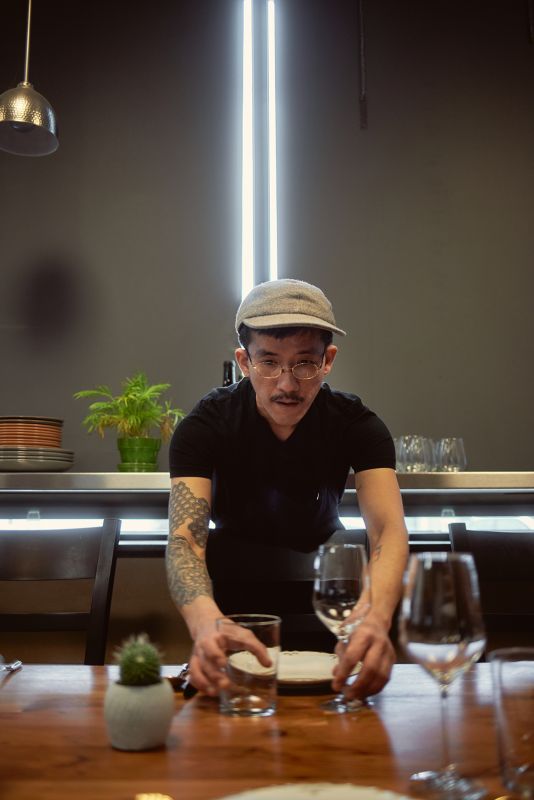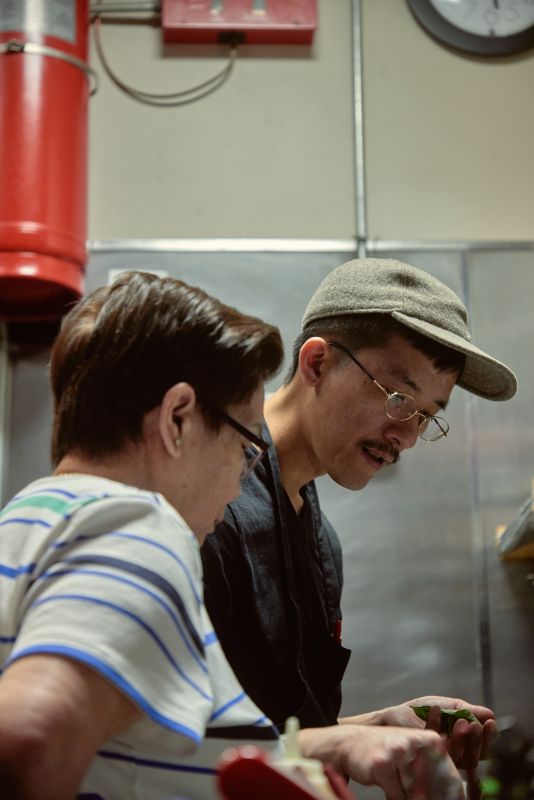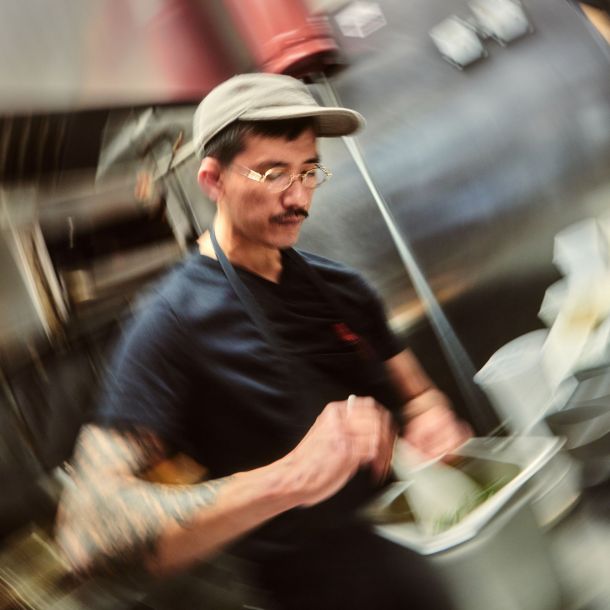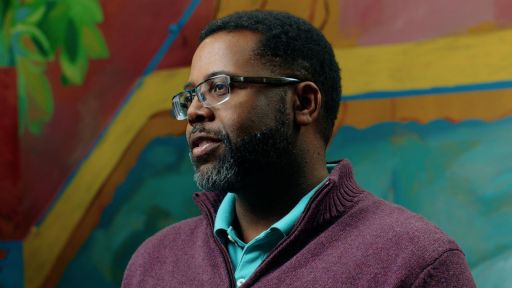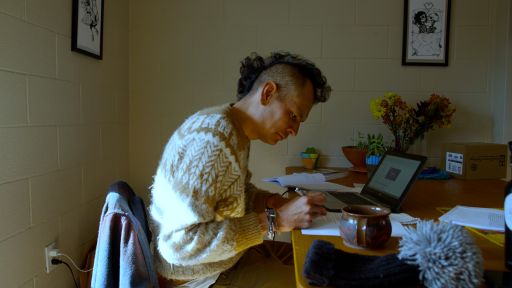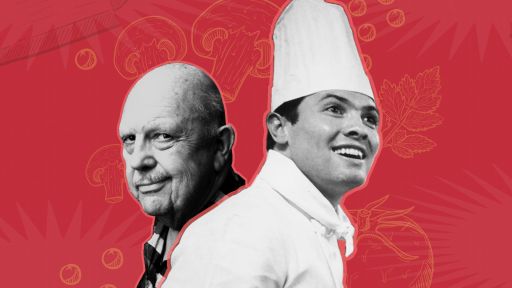Dustin Nakao-Haider’s director statement
Upon first glance, Hermosa – chef Ethan Lim’s Cambodian inspired Chicago outpost – may seem unassuming, with just one table tucked into a quiet section of a tree lined block on Chicago’s Northwest side.
However, with one bite of his signature Cambodian Fried Chicken Sandwich one is suddenly
dropped into a brand new world. A world bursting with flavors that are simultaneously familiar while also transcendent and new. It’s within this liminal space that Ethan Lim opens the door to the question at the center of his artistic process: what would Cambodian culture and cuisine look like, taste like if the country had not been torn apart by war?
This is “culinary futurism.”
Ethan Lim was born in a refugee camp in Thailand in 1981. Years earlier, his parents ran a noodle shop in Cambodia until they, along with millions of others, were forced to abandon their homes and shudder their businesses as the Khmer Rouge seized control of the country and began a violent reign of terror. From 1975 to 1979 nearly one quarter of the population was executed, starved, or imprisoned in labor camps. Those who survived had to begin new lives while carrying the unbearable pain and trauma inflicted upon them during the war.
Lim has no memories of the camps, for him life begins in Chicago in the mid 80s where his family settled. Just as they had done in Phnom Penh, Lim’s family opened a restaurant. Between his parents and siblings, they now own six restaurants around the city.
Like many immigrant families, there was a stark difference between what they served customers versus what they ate at home.
The restaurants almost exclusively sold Chinese American food (orange chicken, general Tso’s etc.) Back at home, Ethan’s mother made funky, vibrant, delicious Cambodian food, with a five year old Ethan Lim employed to work the mortar and pestle and make the kreung; the ubiquitous herb paste found throughout Cambodian cuisine. For their family, it was a matter of dollars and sense, Chinese American food was popular and they built a successful business model that worked. Lim, however, decided to go his own way.
Lim went to culinary school where he was trained in a classic French technique and began working at some of Chicago’s elite kitchens including with the Michelin Star Chef Grant Achtaz’s restaurants the Aviary and NEXT. Things changed in 2016 when Ethan’s father retired and he convinced Ethan to take over the family’s first location. Initially he served hot dogs and hamburgers to the local high school kids – but everything shifted when Lim took his parents to a fancy dinner in Portland. His mother said she never dreamed of dining in such a nice environment, this admission gutted him.
When Covid-19 hit, Lim had time to think deeply about how his family’s history and identity shaped his approach as a chef.
How could he use his culinary artistry and his Buddhist roots to tell their story and elevate the dishes his mother used to make when they were growing up. He wanted to create something in the fine-dining sphere that his parents would feel comfortable at and thus the idea for a multi course tasting menu was born, he dubbed it ‘Family Meal.’
Here he is able to infuse his French training with the Cambodian dishes he ate as a child. Simultaneously he’s conjuring up memories of his past while also creating a futurist cuisine based on how he thinks Cambodian food would’ve evolved if the war had not happened. During the war recipes, techniques, and ideas were lost. Food was scarce and ingredients were severely rationed, cooking just became a means of survival. While Lim didn’t deal with the trauma of war directly, the way his parents and siblings did, it has still made a significant impact on his approach as a chef. He understands resources are finite, so he’s committed to being zero waste, and grows much of his own produce – thus sustainability for him is rooted in survival.
Lim’s parents were skeptical that anyone would want to eat their “funky food” but ‘Family Meal’ has become a resounding hit with critics and diners alike. Reservations are now needed months in advance.
As a culmination of not only the tireless efforts of Lim’s work at the restaurant but his entire family’s culinary legacy, he was awarded the 2022 Jean Banchet Award for Rising Chef of the Year in Chicago. An award voted on by chefs and restaurateurs around the city. Lim brought up his mother to accept the award with him, thanking her for holding onto their family food traditions. With one foot in the past and the other leaping towards an unknown future, Ethan Lim is poised to continue to evolve and grow all while protecting his family legacy.
About Ethan Lim
Ethan Eang Lim is a refugee who immigrated to the United States in the 80s and grew up immersed in the world of his hardworking parents’ Chinese American restaurant. After dropping out of high school, he cut his teeth in retail at Marshall Fields, eventually moving to high-caliber brands such as BMW and MINI, but found himself drawn back to his roots: food. Under his parents’ guidance, he learned the discipline, language, and finesse required to be a chef and attended Kendall College. He would later hone his skills at multiple acclaimed Chicago restaurants, like Spring, The Aviary, The Office, and NEXT. In 2016, he opened his own restaurant Hermosa, initially serving up hot dogs and hamburgers before developing his own Asian style sandwiches. As of last summer Hermosa has become site of “the Family Meal” a a multi-course Cambodian tasting menu, inspired by the dishes his mother used to make at home. Hermosa has quickly become one of the most exciting kitchens in Chicago with a waiting list exceeding six months. Throughout the year Lim uses Hermosa as a site for food drives to give back to his community. When he’s not in the kitchen, Ethan focuses his energy on nature and sustainability, clearing out invasive species at the nature preserve near his home. He grows many of the herbs and vegetables used at Hermosa. The restaurant is committed to being zero waste. Ethan is nominated for Best New Chef and the Jean Banchet Awards 2022.
About filmmaker Dustin Nakao-Haider
Dustin is a Japanese-Desi American filmmaker from Chicago. A two time Emmy-nominee, his work has been supported by the Sundance Institute, Film Independent, ESPN Films, EFILM/Company 3 and Firelight Media/American Masters. His series of photographs, Anonymous Horizon, was published in the latest issue of FAYN Magazine. Most recently he co-wrote “Pali,” a play produced on the Stanford University main stage. Dustin is a co-founder of the production collective Bogie.

